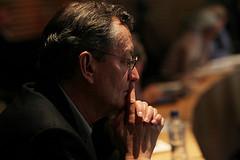Social Change
 21, cited by Gist and Helbert, pp-370-371). Then we can realize that poverty is not only a phenomenon of loss comfort of life in physical, but also mental terms and other interrelated factors that are part of attitudes and values. In cities where extreme poverty is very pronounced emerging behaviors of inferiority, resentment, disappointment and even the spiral of cynicism by the conditions forced to which families are subject. And it is that these families are sharing these psychological effects, coupled with poor health conditions, of intellectual development, habits of consumption and moral conduct. Rebuild community life is a very complex but urgent task. It is not only a problem of providing decent housing in a functional and pleasant environment, but social groups organization, is required to make on their own they can diagnose their priorities, perform work of self-help and institutions to request the corresponding assistances. References bibliographical ASCANIO, Alfredo. (1973).
21, cited by Gist and Helbert, pp-370-371). Then we can realize that poverty is not only a phenomenon of loss comfort of life in physical, but also mental terms and other interrelated factors that are part of attitudes and values. In cities where extreme poverty is very pronounced emerging behaviors of inferiority, resentment, disappointment and even the spiral of cynicism by the conditions forced to which families are subject. And it is that these families are sharing these psychological effects, coupled with poor health conditions, of intellectual development, habits of consumption and moral conduct. Rebuild community life is a very complex but urgent task. It is not only a problem of providing decent housing in a functional and pleasant environment, but social groups organization, is required to make on their own they can diagnose their priorities, perform work of self-help and institutions to request the corresponding assistances. References bibliographical ASCANIO, Alfredo. (1973).
The future of our environment: prospects to the year 2000. Caracas: Sien. GIST, Noel and HALBERT, L.A. (1975). Urban Society.
New York: Thomas Crowell Company. HARRIS, Walter. (1975). The growth of cities in Latin America. Buenos Aires: Ediciones Marymar. LEDRUT, Raymond. (1968). The social space of the city. Buenos Aires: Amorrortu Editores. CURL pattern, Jorge. (1981). Economics of low-income groups. Lima: Universidad del Pacifico. TANGRI, Shanti. (1966). Urbanization, political stability, and economic growth. Editors Jason Finkle and Richard Gable. Political Development and Social Change.
